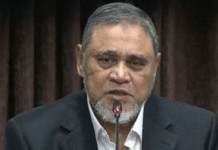A Year Since Road Safety Demo: Lofty promises, little action

After last year’s unprecedented demonstration for safer roads, different government bodies, police, and transport leaders made a series of lofty promises.
Lawmakers hastily passed the Road Transport Act-2018, the Prime Minister’s Office issued a 17-point di-rective, and police observed “traffic weeks” multiple times to bring discipline on roads. For their part, transport leaders also made serious promises of change.
But very little has been done and the picture on Dhaka streets remains almost unchanged.
However, thanks to intensified drives targeting unfit vehicles and errant drivers, the number of people obtaining driver’s licence and vehicle’s fitness clearances have increased and almost all bikers now wear helmets.
Amid this hard reality, the first anniversary of deaths of the two college students that sparked widespread protests for safe roads would be observed today.
Thousands of young people took to the streets in the capital after the two students of Shaheed Ramiz Uddin Cantonment College were run over and killed by a Jabal-e-Noor bus, which ploughed through a crowd while competing with another bus of the same company. The protests spread to different districts as well.
Jahangir Fakir, father of one of the two victims Diya Khanom Mim, yesterday said, “My daughter will never return, but I want safe roads so that no parents have to endure the pain like us.”
EMPTY PROMISES
Terming the agitation an “eye opener”, different government bodies, police, and transport leaders made many promises and took some hasty steps.
Disappointed by the failure of road transport ministry to ensure road safety, the Prime Minister’s Office on August 16 last year issued 17 directives which included ordering buses to pick up and drop off passengers on-ly at designated spots and to keep the doors of running buses shut at all times.
The PMO also ordered keeping photos of drivers and helpers along with their names, drivers’ licences and phone numbers at two noticeable places inside the vehicles, continuing the activities of police’s traffic week until further instructions and introducing a remote-controlled electronic signalling system in the capital.
Drivers of passenger vehicles, especially of the long-haul buses, were asked to fasten their seat belts and the authorities were asked to introduce seat belts for the passengers as well.
But most buses still pick up and drop off passengers in the middle of the roads; very few, if any, vehicles have the documents and photos of drivers and helpers displayed; electronic signalling system has not been intro-duced; seat belts for bus passengers are not there.
Police and BRTA carried out several drives against jaywalking, but failed to make any difference.
According to a BRTA report submitted to the High Court last week, there are 4.79 lakh vehicles without fitness certificates across the country. Of them 2.61 lakh are registered in Dhaka division.

ACT YET TO TAKE EFFECT
The cabinet in March 2017 approved in principle the draft Road Transport Act, but the document collected dust at the law ministry for over a year as transport leaders opposed some of its provisions.
Amid widespread protests, the cabinet hastily gave the final approval to the draft law and in September the Jatiya Sangsad passed the Road Transport Act. Road Transport and Bridges Minister Obaidul Quader said dis-cipline on roads would be restored once the act was put into force.
However, the government did not issue a gazette notification mentioning when the law would take effect.
The government said enforcing some sections of the act would require forming of the rules first.
Officials later said transport leaders were lobbying the government to make several changes in the act, result-ing in the delay.
About the delay, Nazrul Islam, secretary of Road Transport and Highway Division, said transport leaders and several other organisations were demanding changes to some sections of the act. “We will make the law ef-fective after addressing those issues.”
About the PMO directives, he said it would be unfair to hold the ministry solely responsible for ensuring road safety.
DAILY CONTRACTS
Due to the reduction of trips caused by severe traffic congestion in the city, bus owners often rent out their vehicles to the drivers who indulge in reckless driving just to maximise profit by operating as many trips as possible.
Following last year’s agitation, transport owners announced that they would shun the practice.
Khondaker Enayet Ullah, secretary general of Bangladesh Road Transport Owners Association, said around 40 percent buses were still rented out to drivers.
“Owners are forced to do this as there is no ticket-selling counter from where the owners can sell tickets,” he said.
He claimed that the city’s transport system had improved a lot and they were constantly working with the authorities and police for further improvement.
WHAT EXPERT SAYS
Prof Mizanur Rahman, director of the Accident Research Institute at Buet, said, “We expected a change after the student movement, but unfortunately, nothing has changed.”
Terming the government initiatives inadequate, he said, “One must wonder whether the government is failing to properly realise the depth of the problem.
“It is not possible to eliminate the anarchy in the sector unless there are coordinated efforts.”
Road users have a responsibility as well, he added.
“The government should emphasise more on the issue now. Otherwise, it would be very difficult to solve the problems later.”









